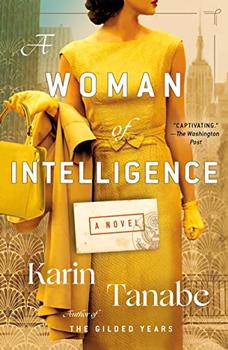Summary | Excerpt | Reviews | Beyond the book | Read-Alikes | Genres & Themes | Author Bio

A Novel
by Lea CarpenterLet me confess that I don't watch a lot of spy movies or read spy novels because the plots are too much to keep up with. Please consider that information an extra endorsement for Ilium by Lea Carpenter, a spy novel that's blissfully accessible. Perhaps I clicked with it because it's much more than a spy novel; it's a story about identity and relationships of all kinds. While I took in the suspenseful narrative I also found myself having a lot of Carrie Bradshaw-esque questions about love. How well do we know the people we love? How much deception is okay? What happens when we don't know who to trust?
I hadn't anticipated those questions going in, but they soon arose. As the book begins, the unnamed 21-year-old narrator is about to marry a man named Marcus. He's twice her age, rich, learned, and adventurous. "'Sleep,' he would say to anyone who proselytized its merits, 'is the only thing that won't go to bed with me,'" the narrator recalls. His charisma is only heightened by his contradictions and quirks, like keeping a minister on his payroll despite never attending church. I could see myself falling for Marcus, and I could see it'd be a terrible idea to get swept up into his restless intensity and guarded ways. "Marcus was a lighthouse. And lighthouses never switch off," the narrator shrewdly says.
She slowly realizes that Marcus is involved in espionage—and now she is too. Marcus gives her crash courses on how to conduct herself to get information from targets. One thing he tells her is to act as if everything is familiar. That caveat extends to even the small details, like eating whatever she's served. Truthfully, I was more unsettled by that idea than anything else about spying. Would I blow my cover by not eating cucumbers? Could I still be a vegetarian? The narrator is content to do as she's told, trusting in the instructions given by Marcus and his contacts. When Marcus abruptly dies from an unnamed chronic illness, all she has left is her newly found espionage network and all she can do is go farther in. She's sent to a French beach house to gather intelligence on the patriarch of an extended family that summers there.
I loved the pacing of the novel, and I definitely felt the suspense build. The narrator learns more about her strange new world slowly, each revelation launching more questions. When she sneaks into her target's bedroom, she's surprised to find a photo of Marcus on his desk. Everyone intersects with each other, but how? Did her target really do all the bad things her handler claims? I spent much of the novel wanting to know who the good and bad guys were despite knowing that binary doesn't exist here. In Ilium, the characters are unreliable and so are their accounts of each other. Moreover, when people have been so deep in the espionage community for decades, who even are they?
While Carpenter acknowledges that identity is slippery, she gives the characters compelling personalities and mannerisms. I grew fond of Elouard's obsession with the Iliad and how Raju plunges his hands into his pockets and looks like a kid. With these details, she lets the "normal" world intersect with the espionage world, which makes the book more real. At the same time, it highlights the strangeness of the people the narrator meets at the house she infiltrates, like a woman who's never eaten a cupcake.
My main quibble with the novel was the required suspension of disbelief: how could the narrator suddenly disappear into this world without any traces of her premarital life resurfacing? We learn about her childhood and meeting Marcus, but what happened in between? While she says she doesn't have close friends, I expected something from her former life to show up, even if it was just a returned security deposit or a postcard from an acquaintance.
However, I realize that great fiction is not often made from stories about returned security deposits. In the end, letting go of mundane expectations is the best way to enjoy this book.
![]() This review was originally published in The BookBrowse Review in February 2024, and has been updated for the
February 2025 edition.
Click here to go to this issue.
This review was originally published in The BookBrowse Review in February 2024, and has been updated for the
February 2025 edition.
Click here to go to this issue.

If you liked Ilium, try these:

by Rachel Kushner
Published 2025
From Rachel Kushner, a Booker Prize finalist, two-time National Book Award finalist, and "one of the most gifted authors of her generation" (The New York Times Book Review), comes a new novel about a seductive and cunning American woman who infiltrates an anarchist collective in France—a propulsive page-turner of glittering insights and dark ...

by Karin Tanabe
Published 2022
From "a master of historical fiction" (NPR), Karin Tanabe's A Woman of Intelligence is an exhilarating tale of post-war New York City, and one remarkable woman's journey from the United Nations, to the cloistered drawing rooms of Manhattan society, to the secretive ranks of the FBI.
Your guide toexceptional books
BookBrowse seeks out and recommends the best in contemporary fiction and nonfiction—books that not only engage and entertain but also deepen our understanding of ourselves and the world around us.